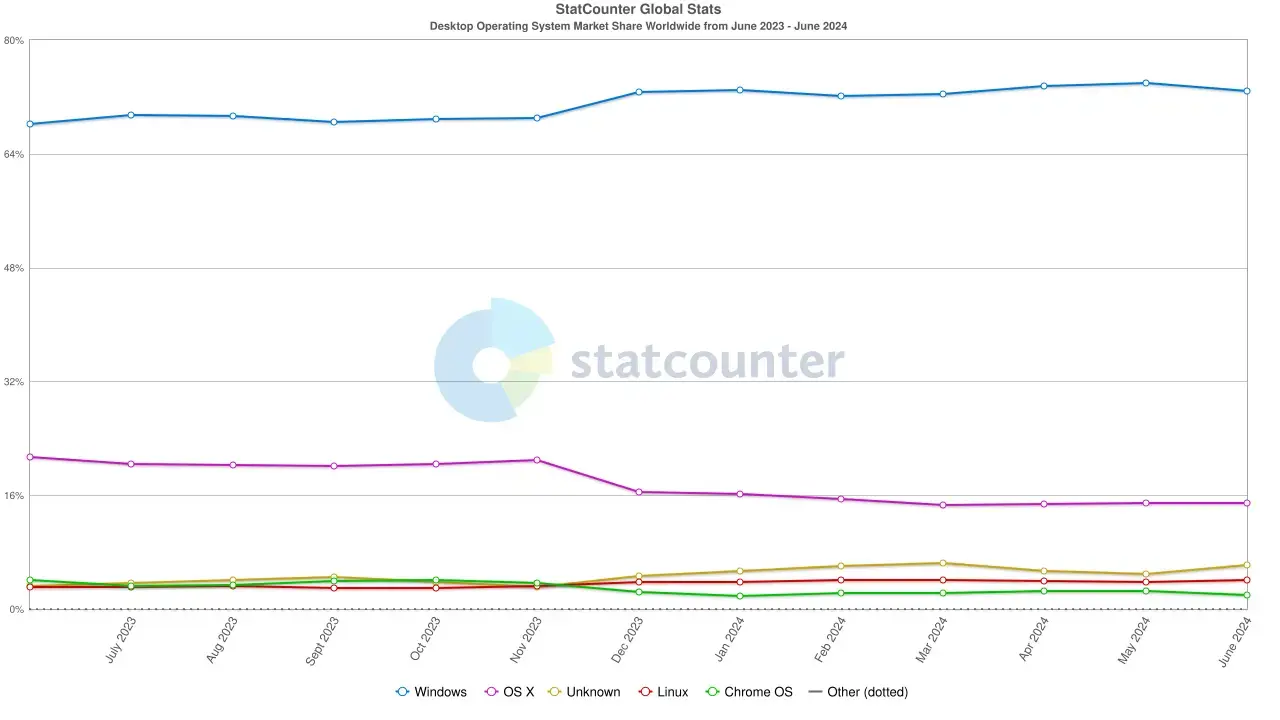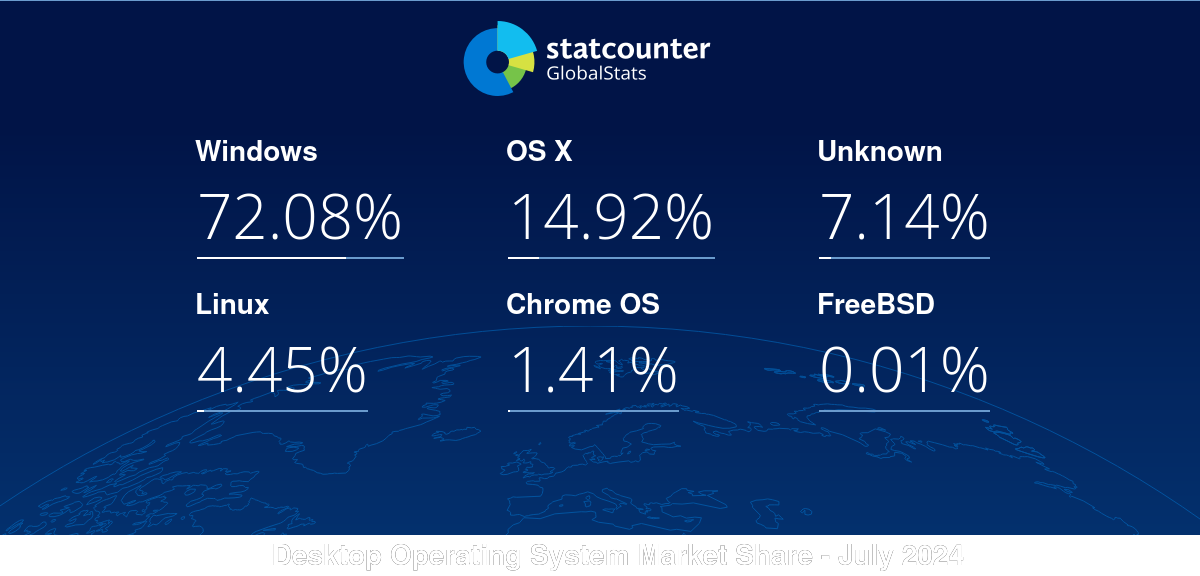nice
deleted by creator
with like 600 comments between them, holy moley
One for every current ~0.5% market share!
Is someone kind enough to post a screenshot of the stats? I can’t access it, because its a known tracking site and get blocked by the plugins.
Okay, I have bit the bullet and made an exception to provide screenshots myself:


Thanks for your service, comrade.
Next time try out visiting the page through archive.org
I didn’t think of it, because I always think or archive.org as older pages/versions. The problem is, is it updated to current? It’s a big site, so probably it will be. Good idea, I’ll check that next time through archive.org.
You can always* request a new archive of a website. If you log in (warning: it has to load google code at least when registering) you can also request a screenshot (which I don’t know how you find later on, but right after you get a link) and recursive archiving with a depth of 1.
Interactive elements remain interactive nowadays, but it has limitations.In some cases archive.today is worth a try too. It has workarounds for e.g. facebook, or at least in the past it had a fake account to be able to save facebook content.
But this one loads whatever code from yandex, so if that’s problematic for you be sure to block it. uMatrix is best for that task, probably uBO can do it too, the Firefox version I mean.These sites are basically my “remote browser”, and often it’ll be even useful for others that I requested an archive. Quite often I’m requesting the first one.
* mostly, but you can’t if the site was very recently archived, like in 30 minutes. Then there are some sites that are blacklisted for some reason but not much.
I wonder what happened to OS X
It does not mean that something happened with MacOS / OS X. If it stays the same and everyone else gets bigger, then the same gets smaller relatively speaking. Look at the dip for OS X in Nov 2023. Looks like almost the same amount of up for Windows. Also Chrome OS went a bit down and Unknown went up, only Linux stays the same.
So either something in their software changed or it was really a phase of people buying new computers and changing their OS. For a fact, I also build my PC in Nov 2023 (but stayed on Linux). Maybe that was a time of new hardware or lower prices, don’t remember exactly.

I understand you’re excited, but aren’t you overdoing it a bit?
We need more cross posts
on Reddit I think it makes sense but on Lemmy it’s usually obnoxious in my experience, because it’s not so populated and busy, the default browsing experience already gives you posts from all over… so unless you strictly browse followed communities (which i don’t know if most people even do this) you end up seeing the same thing over and over.
Quick give me more subs to crosspost
linux_gaming@lemmy.world is on there twice ???
Cool. My wife switched to LMDE yesterday, so that’s one more into the fold.
If only MS Office worked well on Linux, due to her muscle memory, my wife would’ve switched to Fedora for her laptop. Aside from light gaming (Sims 4, mostly), she’s not a tech-person at all, so that’s saying something in my book!
She might adjust to LibreOffice, it borrows heavily from the MS Office UI. I think it’s also available on Windows if she wants to try it before switching. Sims 4 works great on Linux too.
Time to speak to our representatives to switch to Linux Systems as Switzerland did for cyber security and for fiscal responsibility.
We must not fall behind that smart country once again.
What?! All that noise about Switzerland mandating usage of open sourced software in gov (there was a great step, but it’s far from mandating anything) was already weird, now we are switching to linux? And caring about security and fiscal responsibility? There has to be another country called Switzerland than the one I live in.
You’re right, I believe the only thing Switzerland mandated (or wants to mandate?) is for projects built FOR the government to be open sourced - and even then, there are exemptions.
Of course, unlike you, I don’t live in Switzerland, so I’m probably not as informed.
Sorry but Linux is becoming too mainstream for me now. Time to hop on to BSD
Dragonfly BSD, or else it will still be mainstream :)
Oh no, I feel it already the “I was on Linux before it was cool”
Check out mister Mainstream over here. The rest of us snooty OS connoisseurs use Collapse OS.
7.14% unknown!
The year of Plan 9 on the desktop!
I unironically would use it
Please do. Why don’t you yet?
deleted by creator
It says “THE PLAN FELL OFF” and “DO NOT INSTALL”, everything OK over there?
deleted by creator
deleted by creator
Serious question: you’d use that for your daily driver?
Surprisingly many people don’t need the “modern” “web” for daily driving.
deleted by creator
A rare sighting of a Plan 9 user! You need to be protected at all cost! Your species is extremely rare and important for future studies.
BTW for a moment I was upset, because I thought this is a screenshot of Reddit. I kinda like the old look of it.
deleted by creator
What desktop environment is that? Or is it built in by default or doesn’t work quite similar to linux?
deleted by creator
deleted by creator
Are you on oftc?
deleted by creator
ah. I’ve been doing linux things, but maybe i’ll try out gridchat next time i’m on 9front
Out of curiosity, do you use it for fun, or does it provide you with some specific features?
deleted by creator
You explained it so well, that you actually got me interested in trying it some day.
deleted by creator
I wish someone would port Python and BorgBackup to it. Venti/Fossil are not quite as nice for multi-OS backups.
deleted by creator
One of the few times I think where this is not only correct, but also most accurate
Can I join the club, I use 9front
The “unknown” is Windows. If you change the graph to see the whole range from 2008 to date, you will see that whenever there’s a big spike or dip on Unknown, it’s the exact opposite for Windows.
Thanks for ruining it for me.
GNU HURD remains ignored.
Good.
FREEBSD >0.009% RAAAAAH 👹👹👹💪💪💪💪💪🦾🔥🔥🔥
BSD is dying
It is sad but we build up Linux so we have a libre privacy and freedom alternative
Why is it OS X but Windows doesn’t specify which number?
OS/X is just short for Mac OS X, which is what they call their desktop OS.
Not anymore.
They are referring to macOS here
Il feels like every month that passes Linux keeps breaking all time highs! So exciting
Hmm is this really happening so fast? It’s a little hard to believe.
Yes, things move very fast if you haven’t noticed sugar pie
Sus
That’s what she said
I suspect it’s a bump due to Windows Recall. I know I fully switched because of it after 25 years of off and on the Linux Desktop. And I will not be going back.
I suspect it’s a bump due to Windows Recall.
I don’t believe it that much. It may just be the Steam Deck’s financial success. But everything is possible.
I wasnt thrilled about upgrading to win11 - it adds an irritating layer of stuff that I didnt want or need. The ads and telemetry bugged me too. I was probably going to reluctantly upgrade at some point though.
But then recall was announced and I realised how much worse it could get. Been really happy with the switch to Linux.
What distro do you use?
Mint cinnamon 21, then upgraded to 22.
Great choice
Considering this is browser stats I doubt the steam deck has much to do with it, the steam deck is all about never opening anything other than steam.
Are you sure Steam is not one of the data suppliers for it though?
100% switched because of Recall. Been a Linux user on and off for 20 years, windows was my daily driver for the past 5 or so (windows 10 was OK in my mind). Once Recall was announced, I bounced back to Linux. Having Steam popularize gaming on Linux has helped a ton
Maybe not, but, anecdotally, I know of a number of people who have made the switch because of Recall. Steam Deck surely adds to it, but people who have the choice to stop using Windows seem to be doing so.
Maybe not, but, anecdotally, I know of a number of people who have made the switch because of Recall.
Tbh I don’t get it. Wasn’t this feature only on Copilot+ PCs that almost nobody had? Why did so many switch if it wasn’t even confirmed that it’s coming to regular x86 machines? I always find it extremely weird.
Why did so many switch if it wasn’t even confirmed that it’s coming to regular x86 machines?
Panic.
Or they see the writing on the wall
Microsoft showed their hand and for some it was the last straw. It might not come to non-copilot pcs (for now) but they showed users they are OK with turning the OS into spyware.
Imo Windows is not even an OS anymore.
Agreed. It’s mostly an ad delivery platform these days. Can be somewhat OK if you have a DNS based blocker but hard to block built in spyware.
Steam deck alone isn’t much. It’s not even popular in a lot of places in the world. But there a lot of things happening in the market, and each small factor adds up to a general trend. So, there’s no single factor that we can point that will explain the linux growth in marketshare.
Yes, although it’s not evenly distributed. Much of this rise is due to India doing some heavy lifting - they’re on like 16%.
Most places are in the 1.5-3.5% range.
You should go to your local university or knowledge center. The percentage is like 10%-20%
Even 3.5% is quite a lot imo.
Indeed it is. But this is also calculated based on monthly page views, so it only really covers devices that are used in that month.
There’s a non-trivial amount of Windows users that have a dusty laptop that they only pull out when they need to write a document or fill in a form that they got emailed, and will otherwise do all their computing on their phone.
My guess would be that Mac and Linux have fewer of these types of users? But who knows. I have a couple of Linux devices that I almost never use 🤷♀️
I’ve seen many people having Linux on such devices so idk either.
There’s some kind of network effect associated to it, so the greater the numbers, the more likely to grow even more, and faster. For example, when linux was used only by a very few people in it, most people were unlikely to even give it a try, but now that every class or working group, it’s likely to have one or two linux users, more people will be likely to try it, and so on.
How do I hide which OS I am using? What is behind the high Unknown number?
Every browser has a description like
"Mozilla/5.0 (Linux; Android 8.1.0; SM-T580) AppleWebKit/537.36 (KHTML, like Gecko) Chrome/74.0.3729.157 Safari/537.36"called User Agent. You can set this value to something else, but be careful. If you set it to something that does not exist, then it makes it more likely to be identifiable. Or some things could potentially not work right if it expects a specific operating system, in example when downloading files. Usually not a big deal.So ultimately you want to set this value to something that exist and something that is used by many people. There are addons which can make this process much easier or even change it automatically after some time period in example.
Chameleon at https://sereneblue.github.io/chameleon/ is such an addon for the browser. There are lot of other alternatives, I used a few of them in the past, but stopped using them because there was here and there trouble. If you do, I recommend to install this addon from the addon store of your browser and not from the website, but that is just my personal recommendation.
Thank you. So what is being measured is just the browsers people are using? Then I can see why the metrics are more general than precise measurements, as the user agent can be easily changed.
The question is, if they only evaluate the User Agent? This is an organization specialized into statistics, they know it can be modified too. The ad industry tries to track you and find out everything about you despite these modifications. Don’t underestimate them!
Fair enough. They still don’t know what >7% of people are using, though.
That 7% might not even be people. It could be bots doing HTTP requests and throwing garbage in the user-agent.
Use user agent switcher and set it to something random. However that makes your fingerprint unique. I’ve read that people set it to windows just to blend in the masses
Is the data of specific distros available somewhere ?
Unsurprisingly, usage numbers for distros are hard to get due to lack of telemetry and what not.
However, some measurements do exist; like data from ProtonDB. These are used by Boiling Steam for their excellent reports in which some representation regarding usage across distros can be found. Their most recent report can be found here.
Note, however, that the following, as has been excellently touched upon by Boiling Steam, applies:
COMMON MISCONCEPTIONS
Since we hear some of the following comments EVERY SINGLE TIME, let’s address them here and now:
- “Duh, it’s not representative of Linux usage in general!”: And nowhere does it claim to be. As often as possible we make it clear this is Linux usage in a gaming context. The usage of Debian and Ubuntu on servers is safe for now, no need to panic.
Thank you. This does give an idea.
Follow up question : Is Arch really that good?
Thank you. This does give an idea.
It has been my pleasure.
Follow up question : Is Arch really that good?
Depends entirely on your needs. There is a use case for Arch. However, if you’re completely new to Linux, then it’s very likely that a ‘slower’-moving distro (like (anything based on) Debian (or Ubuntu)) might better suit you.
Cool
























